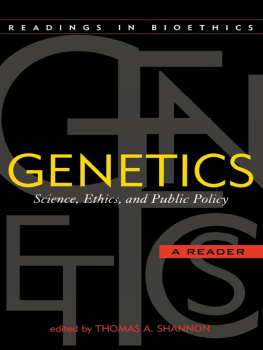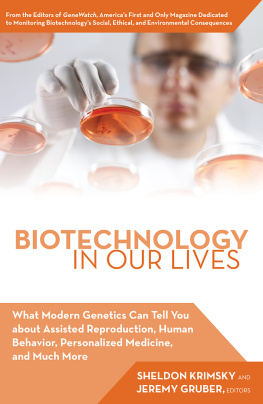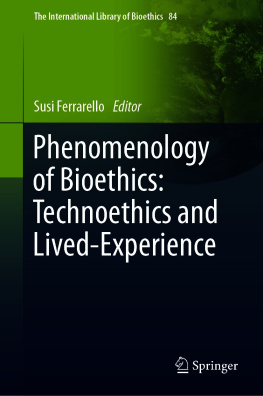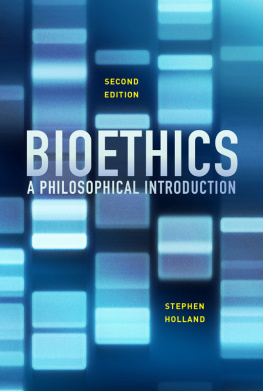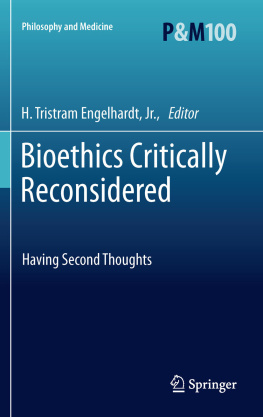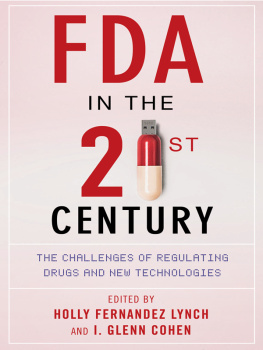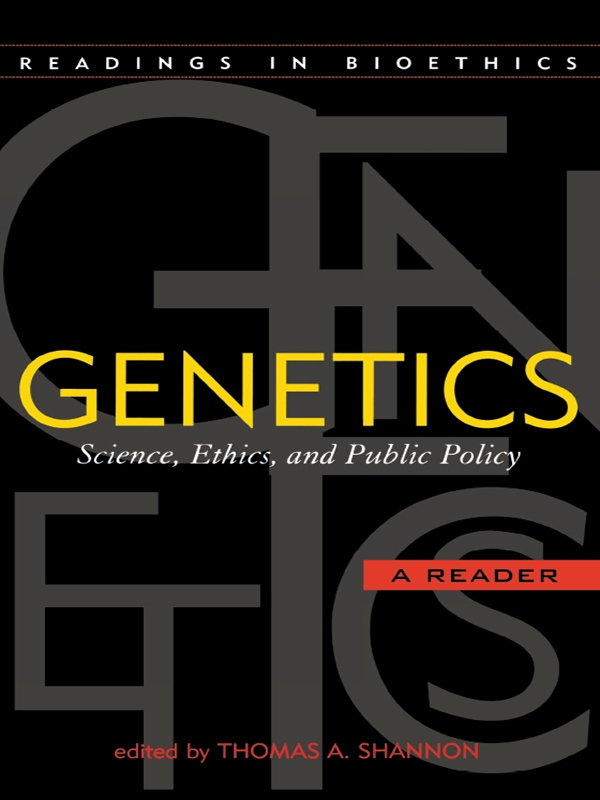Acknowledgments
Gratefully acknowledged are the publishers and authors of the works listed below for their permission to reprint their publications.
Francis Fukuyama, Biotechnology and the Threat of a Posthuman Future. The Chronicle of Higher Education (22 March 2002): B7B10. Permission granted by the author.
Jason Scott Robert and Franoise Baylis, Crossing Species Boundaries. American Journal of Bioethics 3 (2000): 113, 2003 by the Massachusetts Institute of Technology.
Annette Patterson and Martha Satz, Genetic Counseling and the Disabled: Feminism Examines the Stance of Those Who Stand at the Gate, Hypatia 17(2002): 118142. Permission granted by Indiana University Press.
Gregory E. Kaebnick, The Natural Father: Genetic Paternity Testing, Marriage, and Fatherhood. Cambridge Quarterly of Health Care Ethics 13 (2004): 4960. Reprinted with the permission of Cambridge University Press.
Dena Towner and Roberta Springer Loewy, Ethics of Preimplantation Diagnosis for a Woman Destined to Develop Early-Onset Alzheimer Disease. The Journal of the American Medical Association 287 (2002): 10381040. Permission granted by the American Medical Association.
Mark P. Aulisio, Thomas May, and Geoffrey D. Block, Procreation for Donation: The Moral and Political Permissibility of Having a Child to Save a Child. Cambridge Quarterly of Healthcare Ethics 10 (2001): 40819. Reprinted with the permission of Cambridge University Press.
Muin J. Khoury, Linda L. McCabe, and Edward R. B. McCabe, Population Screening in the Age of Genomic Medicine. The New England Journal of Medicine 348 (2003): 5058. Copyright 2003 Massachusetts Medical Society.
Hawley Fogg-Davis, Navigating Race in the Market for Human Gametes. The Hastings Center Report 31 (2001): 1321. Permission granted by the author and The Hastings Center.
Rebecca S. Eisenberg, How Can You Patent Genes? American Journal of Bioethics 2 (2002): 311. Adapted from Who Owns Life? ed. David Magnus, Arthur Caplan, and Glenn McGee. Amherst, N.Y.: Prometheus Books, 2002. By permission of Prometheus Books.
The Presidents Council on Bioethics, Monitoring Stem Cell Research. Chapter 2 of Current Federal Law and Policy. Washington, D.C.: GPO.
Konrad Hochedlinger and Rudolf Jaenisch, Nuclear Transplantation, Embryonic Stem Cells, and the Potential for Cell Therapy. The New England Journal of Medicine 349 (2003): 27586. Copyright 2003 Massachusetts Medical Society.
About the Editor and Contributors
Thomas A. Shannon is professor of religion and social ethics in the Department of Humanities and Arts at Worcester Polytechnic Institute.
Mark P. Aulisio is director of the Clinical Ethics Program at MetroHealth, Case Western Reserve University.
Franoise Baylis teaches at Dalhousie University.
Geoffrey D. Block is director of Liver and Pancreas Engineering program at University of Pittsburgh School of Medicine.
Rebecca S. Eisenberg is at the University of Michigan School of Law.
Hawley Fogg-Davis is in the Department of Political Science at University of WisconsinMadison.
Francis Fukuyama is Bernard L. Schwartz Professor of International Political Economy at the Paul H. Nitze School of Advanced International Studies of the Johns Hopkins University.
Konrad Hochedlinger is at the Whitehead Institute for Biomedical Research.
Rudolf Jaenisch is at the Department of Biology at Massachusetts Institute of Technology.
Gregory E. Kaebnick is the editor of the Hastings Center Report.
Muin J. Khoury is at the Office of Genomics and Disease Prevention, Centers for Disease Control and Prevention, Atlanta.
Roberta Springer Loewy is in the Bioethics Program at the University of California, Davis.
Thomas May is director of graduate studies in bioethics at the Medical College of Wisconsin.
Linda L. McCabe and Edward R. B. McCabe are at the Department of Human Genetics and Pediatrics, the David Geffen School of Medicine at the University of California, Los Angeles.
Annette Patterson is a genetic counselor at the Center for Cancer and Blood Disorders at the University of Texas Southwestern Medical School in Dallas.
Jason Scott Rober t teaches at Dalhousie University.
Martha Satz is assistant professor of English at Southern Methodist University in Dallas, Texas.
Dena Towner is in the Department of Obstetrics and Gynecology at the University of California, Davis.
Biotechnology and the Threat of a Posthuman Future
Francis Fukuyama
I was born in 1952, right in the middle of the American baby boom. For any person growing up as I did in the middle decades of the 20th century, the future and its terrifying possibilities were defined by two books, George Orwells 1984 (1949) and Aldous Huxleys Brave New World (1932).
The two books were far more prescient than anyone realized at the time, because they were centered on two different technologies that would in fact emerge and define the world over the next two generations. The novel 1984 was about what we now call information technology: Central to the success of the vast, totalitarian empire that had been set up over Oceania was a device called the telescreen, a wall-sized flat-panel display that could simultaneously send and receive images from each individual household to a hovering Big Brother.
Brave New World , by contrast, was about the other big technological revolution about to take place, that of biotechnology. Bokanovskification, the hatching of people not in wombs but, as we now say, in vitro; the drug soma, which gave people instant happiness; the feelies, in which sensation was simulated by implanted electrodes; and the modification of behavior through constant subliminal repetition and, when that didnt work, through the administration of various artificial hormones.
With at least a half-century separating us from the publication of these books, we can see that, while the technological predictions they made were startlingly accurate, the political predictions of the first book, 1984 , were entirely wrong. The year 1984 came and went, with the United States still locked in a cold-war struggle with the Soviet Union. That year saw the introduction of a new model of the IBM personal computer and the beginning of what became the PC revolution. But instead of becoming an instrument of centralization and tyranny, it led to just the opposite: the democratization of access to information and the decentralization of politics. Instead of Big Brother watching everyone, people could use the PC and Internet to watch Big Brother, as governments everywhere were driven to publish more information on their own activities.
Just five years after 1984, in a series of dramatic events that would earlier have seemed like political science fiction, the Soviet Union and its empire collapsed, and the totalitarian threat that Orwell had so vividly evoked vanished. People were again quick to point out that those two eventsthe collapse of totalitarian empires and the emergence of the personal computer, as well as of other forms of inexpensive information technology, from TVs and radios to faxes and e-mailwere not unrelated.
The political prescience of the other great dystopia, Brave New World, remains to be seen. Many of the technologies that Huxley envisioned, like in vitro fertilization, surrogate motherhood, psychotropic drugs, and genetic engineering for the manufacture of children, are already here or just over the horizon. But this revolution has only just begun.

